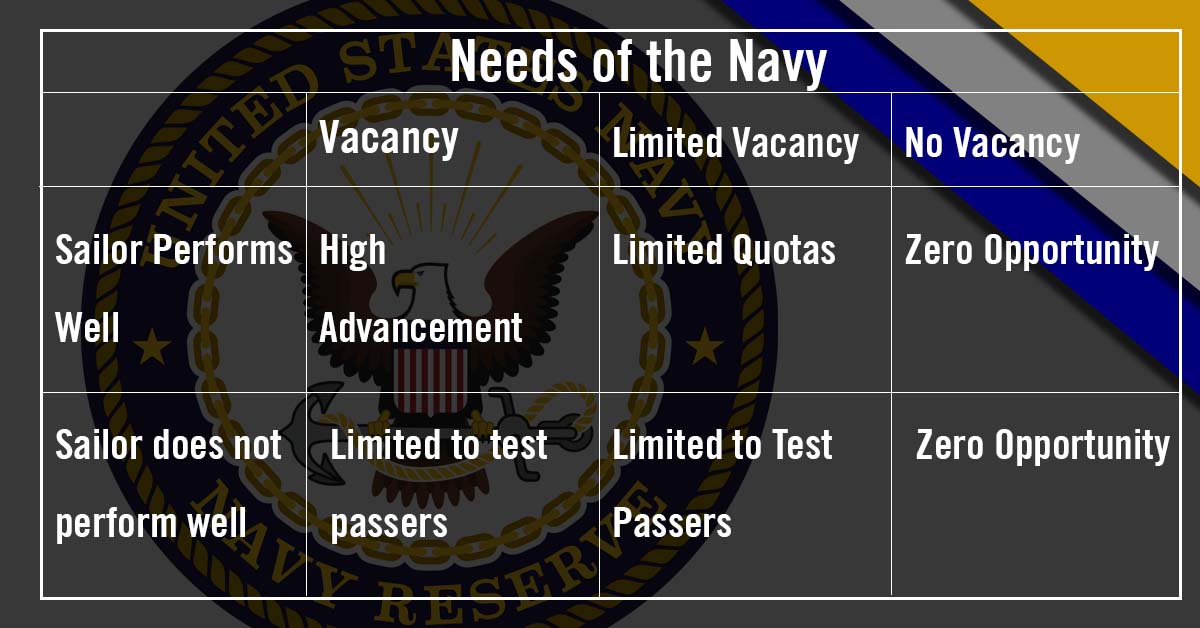Advancement Season is upon us. It’s one of the most sacred times in a Sailor’s career. It’s the highlight of a tour for a Commanding Officer, Executive Officer, or Command Senior Enlisted Leader. A mark of true accomplishment, where Sailors are rewarded for years of hard work in a symbolic act of tacking the crow.
I remember past cycles where I would close my door after viewing the TRIAD results on BUPERS Online. Sometimes because my Sailors set a new personal record at the Command on our advancements. And other times, because our results were admittedly lacking.
Why aren’t our Sailors studying? This is a leadership issue. I need to speak with the Wardroom and the Chiefs’ Mess on drill weekend. More recently, I struggled with the notion that Sailors weren’t completing PMK-EE, or were missing a periodic evaluation to complete their advancement worksheet. They were losing the opportunity to test before the exam even kicked off.
A couple of cycles into my Command tour, my Senior Enlisted Leader, ITC (SW/AW/IW) Rudy Gonzalez Jr., gave me 3 stacks of paper: the profile sheets of our Sailors—those who failed, those who passed but did not advance, and those who advanced. He gave me a thorough overview of where his concerns were, and where mine should be.
First, ITC went over the failures. I found the review to be fairly cut and dry. Our Sailors who failed were not prepared for the exam (or were not proficient test-takers). Many were quality Sailors – good people who seemed to have it together on nearly every front. The leadership messaging was clear – study harder and good things will follow. In the Enlisted Community Management shop, failures drive what we call ‘eligible-limited’ advancements. This means we have more quotas than we have test-passers. Essentially, we leave opportunities on the table, and quotas are reduced down to match the number of test passers.
The second stack was a little more complicated. These Sailors had passed, but quotas were limited to some degree. The Sailors had respectable evaluations, decent exam scores (some stellar) – maybe even an award or two that helped boost their final multiple score. Unfortunately, the Navy Reserve only had room for a limited number of Sailors within that rate and paygrade.
There are two points of emphasis to share with this second group of Sailors. First and foremost, it’s not necessarily the Sailors’ fault that the
needs of the Navy limited advancement – particularly in those rates that see zero quotas in an exam cycle. The messaging remains steady: that they should study hard and always remain prepared to prove their in-rate knowledge; that they are trained for their billet and prepared to mobilize. It is also important to note that as we design the Reserve Force for future warfighting requirements, we may see shifts in vacancy across communities to better align with mission objectives. Vacancy drives advancement, but vacancy can certainly shift over time as we grow and evolve.
Warfighting readiness starts with in-rate knowledge. Passing without advancing is not a call to relax our level of effort. In fact, I would implore Sailors to control the two main factors that they
can control – sustained, superior performance and sustained, superior in-rate knowledge.
The third stack was one that I perceived to be a group of Sailors who had done their part and their hard work aligned well with the needs of the Navy. These were
wins in my mind. And as Chief Gonzalez pointed out,
many were wins. But some Sailors were beneficiaries to growth of their communities. The Sailors did their part, but the timing was also fantastic. Some Sailors could have very well ended up in the second stack if not for the needs of the Navy.

We are not just building a Navy of world-class Petty Officers; we are building future Chief Petty Officers. Leaders owe it to our enlisted Force to help them understand when they have hit a home run and when they have struck out; and to understand when the needs of the Navy have prevailed, and when the needs of the Navy have aligned.
If you advanced this cycle, congratulations on a job well done. Take the time to review your profile sheet and understand what your next steps are for your next advancement exam, or for our new E-6’s, your first promotion board. The process of reviewing your profile sheet is invaluable, and is an art behind the science of becoming a member of our Chiefs’ Mess or Wardroom.
For those that did not advance,
there’s always next cycle. Looking ahead to the spring Navy-wide Advancement Cycle, stay focused on your pre-requisites to sit the exam. Study hard. Knock out your PMK-EE (due December 31, 2022). And keep the press on your performance. Good things are sure to follow.
For our Reserve Unit leadership, take advantage of talent management tools at your disposal – e.g. Meritorious Advancement Program and evaluations. Let your Sailors know what it means when they fall into one of the three stacks. Review profile sheets, and let them know with specificity where they stand. If they struck out, find out why. Find out their study habits. Find out their proficiencies. Find an in-rate opportunity for orders or drilling with their gaining Command. Make sure they’re ready for
next cycle.
Additional inputs from:
ISCM N. E. Ferguson, USN
PSCM N. N. Maher, USN
BUPERS-352 Reserve Enlisted Community Management